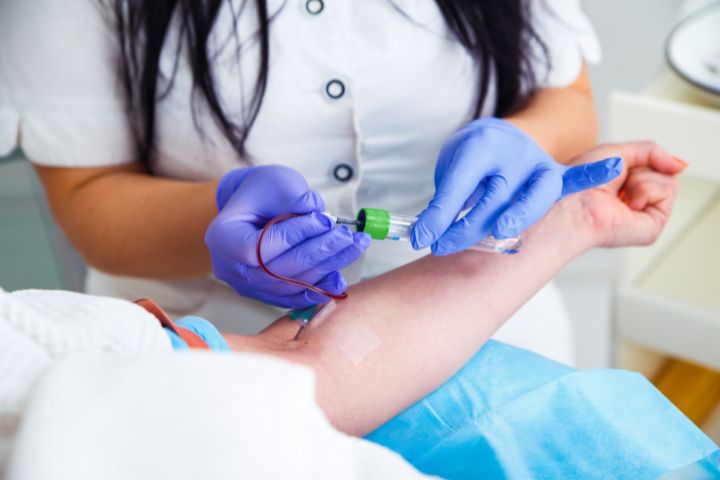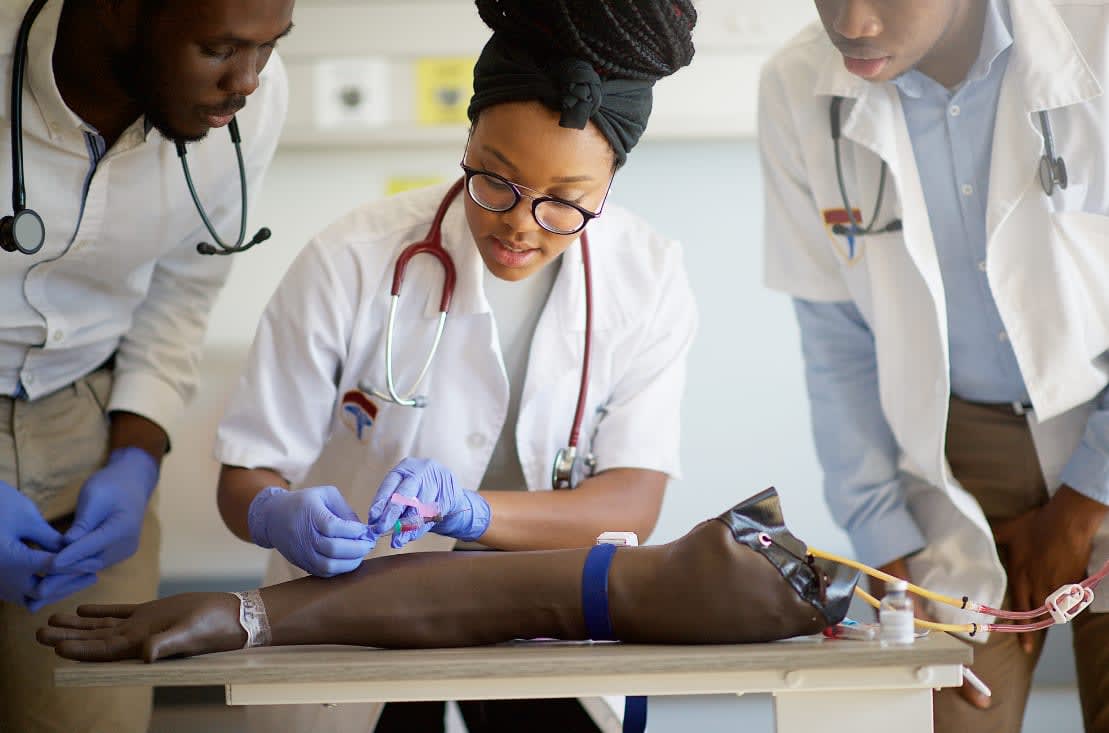Phlebotomy school vs Other Healthcare Paths: Which One Is Right for You?
Phlebotomy school vs Other Healthcare Paths: Which One Is Right for You?
Blog Article
The Course to Accreditation: Recognizing the Phlebotomy Educating Course Journey and Its Value
As you consider the path to accreditation in phlebotomy, it is essential to understand the role you'll play in health care. Your training will certainly cover crucial abilities, from blood collection strategies to patient communication. Each component of the program prepares you for the challenges ahead. What exactly does the journey involve, and why is accreditation so critical for your future job? Allow's discover these questions further.

The Role of Phlebotomists in Healthcare
Phlebotomists play a crucial duty in the health care system, acting as the vital web link between people and essential analysis testing. You'll perform blood attracts, making sure samples are accumulated accurately and securely. Your know-how assists in diagnosing clinical problems, checking wellness, and guiding therapy decisions.
In your everyday interactions, you'll require to develop count on with individuals, making them feel comfy during what may be a difficult experience. You are in charge of identifying and handling examples meticulously to stop contamination or errors, which might influence test outcomes.
Past this, you'll often work together with physicians and registered nurses, connecting crucial info regarding people' problems. By mastering your skills, you contribute meaningfully to client care, making you a vital component of the clinical group.
Review of Phlebotomy Training Programs
When exploring phlebotomy training programs, you'll find various types made to fit different schedules and learning styles. Each program helps you develop vital skills like blood collection and client interaction. Comprehending these options is essential to selecting the best path for your profession.
Types of Training Programs
Numerous types of training programs are readily available for those looking to become proficient in phlebotomy. Furthermore, some medical facilities and facilities provide on-the-job training programs, giving useful experience while you discover. Whatever course you choose, each program intends to equip you with the needed abilities for a successful phlebotomy job.

Secret Abilities Developed
Grasping phlebotomy calls for a collection of key skills that are established via comprehensive training programs. You'll discover technological skills like correct capillary choice, needle insertion, and blood collection strategies. These hands-on techniques guarantee you can carry out procedures safely and successfully. In addition, interaction abilities are fundamental; you'll need to interact with clients, describe treatments, and placed them comfortable. Recognizing makeup and physiology is crucial, too, as it helps you locate capillaries and comprehend the body's action to blood draws. Ultimately, you'll obtain expertise of safety and security methods and infection control, ensuring you keep a clean and sterile setting. Each of these abilities is crucial for your success as a qualified phlebotomist, making you a beneficial possession in any type of healthcare setting.
Key Parts of a Phlebotomy Course
In a phlebotomy course, you'll concentrate on essential subjects that prepared for your future career. You'll take part in hands-on training that allows you to use what you've found out in real-world settings. Both the curriculum and useful experience are crucial for your success as a phlebotomist.
Curriculum Review
While pursuing a phlebotomy training program, you'll experience a curriculum developed to outfit you with fundamental abilities and knowledge. Phlebotomy Training Course. This educational program generally includes makeup and physiology, concentrating on the circulatory system and recognizing blood components. You'll additionally discover various kinds of blood collection techniques, consisting of venipuncture and capillary puncture strategies
Additionally, infection control and safety methods are vital elements, guaranteeing you understand exactly how to maintain a clean and sterile setting. You'll examine patient communication, highlighting communication and empathy, which are important for alleviating individual anxiousness.
Hands-On Training Experience
Obtaining hands-on experience is a crucial part of your phlebotomy training course. This functional training enables you to apply what you've learned in a real-world setup, enhancing your skills and self-confidence. You'll practice venipuncture techniques, learn how to handle different kinds of specimens, and obtain accustomed to the tools utilized in the field. Under the guidance of seasoned teachers, you'll fine-tune your skills, guaranteeing you're gotten ready for any situation you could deal with.
In addition, you'll obtain the possibility to interact with individuals, which is vital for developing your interaction abilities. This combination of technological efficiency and social skills is essential for your success as a licensed phlebotomist. Inevitably, hands-on training is where theory fulfills method, strengthening your understanding and preparedness for accreditation.
Qualification and Licensing Requirements
Prior to you can begin your profession in phlebotomy, it is essential to understand the qualification and licensing requirements that vary by state. Most states call for phlebotomists to hold a certification from an acknowledged company, such as the National Phlebotomy Association or the American Society for Professional Pathology. These certifications normally involve passing an examination that examines your knowledge and skills in the area.
Along with certification, some states have specific licensing demands. You might require to finish a certain number of hours in professional practice, submit proof of training, or undertake a background check. It is essential to research your state's laws to make sure you meet all required requirements.
Remaining educated concerning these needs not just helps you secure a position but likewise enhances your integrity as a specialist. By meeting these needs, you'll be well on your means to an effective job in phlebotomy.
Hands-On Training and Practical Experience
Hands-on training and practical experience are essential components of your phlebotomy education, as they allow you to use academic expertise in real-world circumstances. During your training, you'll participate in supervised venipuncture, learn proper techniques, and become acquainted with various blood collection tools. This direct participation is vital for building your self-confidence and refining your abilities.
You'll work closely with experienced specialists that can lead you with the nuances of patient communication and example handling. Each session not only enhances your understanding yet likewise prepares you for the fast-paced environment of medical care settings.
Additionally, numerous programs incorporate clinical turnings, enabling you to experience diverse setups, from health centers to outpatient centers. This exposure aids you adapt to various difficulties and client demands, ensuring you're well-prepared for your future role. Accept these opportunities, as they're crucial to coming to be a competent and thoughtful phlebotomist.
Difficulties Encountered During Training
While getting hands-on experience is important, it's crucial to identify the challenges that can occur throughout your phlebotomy training. Additionally, mastering the skills needed for blood attracts takes technique; you might have a hard time with technique at first.
Time monitoring can additionally be a hurdle, as balancing theory, functional sessions, and individual dedications can really feel intimidating. You may deal with differing finding out rates among your peers, resulting in feelings of self-doubt if you believe you're falling back. Adjusting to the various individualities of teachers can be tough, as each might have an one-of-a-kind training design.
Identifying these barriers beforehand can prepare you for success and aid you develop strength throughout your training trip.
Profession Opportunities After Certification

As you obtain experience, you may even take into consideration specializing in locations like pediatric or geriatric phlebotomy, providing to certain patient demands. Some phlebotomists select to progress their professions by coming to be lab specialists or pursuing additional education and learning in health care areas.
Furthermore, your qualification can result in duties in training or monitoring brand-new phlebotomists, allowing you to share your understanding. With the medical care industry continuously growing, your skills will certainly always be in need, paving the method for a secure and fulfilling occupation. Embrace the chances waiting for you!
Often Asked Inquiries
What Is the Typical Duration of a Phlebotomy Educating Training Course?
Phlebotomy training courses normally last around four to eight weeks. You'll involve in hands-on practice, classroom direction, and on-line learning. Completing this training prepares you for qualification and a rewarding profession in medical care.
Are Online Phlebotomy Courses Available?
Yes, on-line phlebotomy courses are offered. They use adaptability and ease, allowing you to study at your very own speed. Just verify the program is recognized to satisfy accreditation needs and gain Phlebotomy Classes Near Me valuable skills for your profession.
Just How Much Does Phlebotomy Training Commonly Price?
Phlebotomy training typically costs in between $700 and $2,500, depending on the program and location. You should consider factors like course size, included products, and hands-on experience when picking the appropriate training for you.
What Are Common Requirements for Phlebotomy Training?
Usual prerequisites for phlebotomy training frequently consist of a secondary school diploma or GED, immunizations, and a background check. Some programs might likewise require standard medical care knowledge or certifications, guaranteeing you're gotten ready for hands-on training.
Can I Function While Completing My Phlebotomy Training?
Yes, you can work while finishing your phlebotomy training. Numerous pupils balance jobs with their research studies, but make certain to handle your time effectively to assure you satisfy both job and training dedications effectively.
Report this page